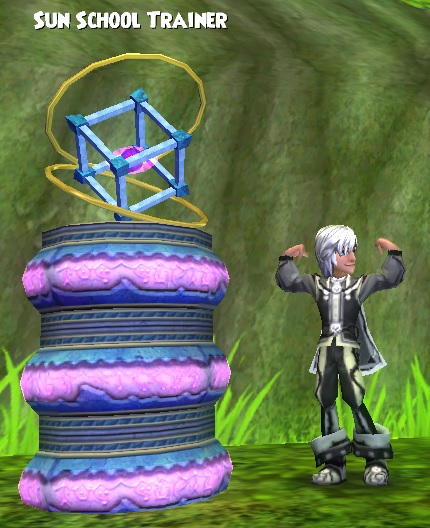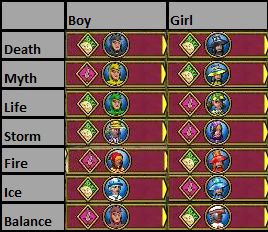October 6, 2017 December 9, 2018
From Zero to Hero:
Beginners’ PvP Guide
Part 2 – Non-Fighting Essentials
PvP is a fantastic Wizard101 endgame activity but it’s also the hardest one. Requirements to even survive in private ranks are insanely high, not to mention obtaining that shiny warlord badge. Sounds pretty scary, right? Don’t get discouraged, we’ve got you covered. In this second installment of the Zero to Hero Beginner’s Guide we will be covering PvP non-fighting essentials.
This From Zero to Hero guide is divided into four parts and we’ll cover everything you need to know to start being competitive in the Arena. Don’t get scared about this wall of text, which is aimed at privates. The road to higher ranks becomes significantly easier once you master the basics. Imagine this as a life process. It’s really hard to learn how to walk. However, once you do learn it, figuring out how to jump and run becomes a much easier task.
Before Starting with Randked PvP: Part 1 Fighting Essentials: Part 3 School Specific Breakdown: Part 4
Have a Lot of Gold!
And no, a lot of gold isn’t only to supply your tournament shenanigans. You’ll need gold for them, that’s for sure, but that’s just the beginning. Pets are another costly thing and these two things alone can make your hard earned gold disappear in no time. And when you get all the gear you need and a good pet… well you’ll need to waste some more gold. You’ll need to purchase all those sweet treasure cards in order to maximize your chances of winning PvP matches.
If you have a high level wizard or own several gardens you might be good, but obtaining large amounts of gold on lower levels can be an issue. That’s why it’s highly recommendable to have at least one high level wizard. It’s going to make your farming life much easier. There are plenty of good places where you can farm for gold, but Halfang in Vestrilund is by far the most popular choice among wizards.

Make a Good Deck
Having a well-constructed deck is quite important. There are plenty of spells to choose from and you need to find out which belong in PvP and which don’t. The number of available spells is way too long to list, but here are some basic things (besides attacks) you might want to add:
- Spells that buff your attacks (blades, bubbles);

- Spells that de-buff your opponent’s attacks (weaknesses, shields);
- Minions;
- Auras (infallible, fortify);
- Heals and heal de-buffs;
- Sun enchant spells (damage enchants);
- Shield breakers (shatter, DoTs, double hits, off-school attacks).
Be careful that you don’t fill your deck with too many attacks. You need utility spells to build up your pips and include more strategy into the fight. Just think about how many attacks it usually takes to finish the fight. You definitely don’t need 30 attacks clogging your main deck, especially since you’ll most likely have plenty of back-up tc’s anyway.
If you’re struggling with creating a good deck set-up, you might want to check some set-up videos on youtube or check some guides on our site or other forums, such as this. Just keep in mind that this should give you a general idea of how a deck should look. What works for someone else might not work for you. You can try adjusting it right away or try some ranked matches to see which spells you don’t need and which ones you’re missing.
Know your opponent
The first thing you should do after entering the battle ring is check what school your opponent is. You can do that by clicking on the Menu chat bubble -> Battle -> Battle orders. You’ll see the position (Dagger, Key, Moon, Eye,…) along with a wizard’s head. In 1v1 you can ignore the position because only your opponent is displayed, but in team matches you should pay attention to not mix up the schools.
The most important thing is the color of the wizard’s outfit. This will tell you what school you’re fighting:

- Death: black;
- Myth: yellow (Careful! female Myth colour can be easily mistaken for life school);
- Life: green;
- Storm: purple;
- Fire: red;
- Ice: blue;
- Balance: brown or white, depend on gender, females have a white hat
Now when you know the school, you can start discarding according to this knowledge (for example you don’t need fire/storm shields when fighting a death wizard).
The next step is determining your opponent’s playstyle. If they never heal and like to keep hitting you, you may want to discard all infections/dooms and focus on shielding. On the other hand, if they’re hyper-defensive you can play a bit slower and set up your attack. Forcing your opponent into your playstyle is an important aspect, but in order to achieve this you’ll often need to adapt to them first.
The best way to figure out how your opponents playstyle is by watching matches. Watch matches around your level and rank – scout your possible opponents so you’ll be prepared for them before even starting the match. Now, I’m not saying that you should watch matches all the time, but to choose appropriate ones when you do.
Chatting?
 Did you ever wonder why there is level 1 talking instead of the player in the fight? Or why they don’t say a word, despite you being polite and saying “Hi”? It’s connected to the previous paragraph: they don’t want you to know anything about them. While chatting is nice, it can wait until the end of the match or at least until you both have figured out what you’re wearing and how you’re playing.
Did you ever wonder why there is level 1 talking instead of the player in the fight? Or why they don’t say a word, despite you being polite and saying “Hi”? It’s connected to the previous paragraph: they don’t want you to know anything about them. While chatting is nice, it can wait until the end of the match or at least until you both have figured out what you’re wearing and how you’re playing.
If you talk, people can and will click on your name and check your damage, resist, pet, etc. Then, they will play according to what they see. For example, if you have a pet with enfeeble they’ll be careful with blades and use extra storm dispels. If you have no resist they’ll save one round by not casting infallible. Having a large healing boost will make them pay some extra attention to infecting or dooming.
DON’T give your opponents any unnecessary advantage.
Sportsmanship
Treat others the way you want to be treated. The wizard101 arena is no exception. If you are much better at PvP than your opponent, don’t trash talk or discourage them by talking down to them. Instead offer them help or at least provide some tips on how to improve themselves, even offering a hatch works. Many players want our pets, but are simply too afraid to ask. You’ll do much more than just helping a player out. You’re spreading positivity, which can work like a chain reaction. After you help them, they’ll help someone else once they become better.
The same rule applies to losing matches. Especially if it was unfair and your opponent rubs their win to your face. Don’t encourage them, just take a few deep breaths, say “gg” (if you want) and port away. A Lot of players want you to get upset and start talking back. You know what they say: don’t feed the trolls. It can be a hard task, but you’ll feel much better once you learn how to avoid talking to them.
So, what should you say after the match? There’s nothing wrong with remaining quiet, but a simple “gg” is a nice gesture. If you feel that “gg” might be a little inappropriate due to the flow of the battle, you can use an alternative like “Well played” or “You did well”.

Learn from Mistakes
We all love to blame RNG and the turn system for losses. While there is some truth in that, that’s far from the only reason for losing. Was there a situation where you bladed instead of putting up a shield? As a consequence you got hit, and the battle snowballed from there on? Or did you put up a shield and your opponent simply removed it with a fire beetle? There are so many things that influence the battle, even a small change could make it flow completely differently.
The best way to analyze your matches is by recording them. Record them and rewatch them later, you’ll get a totally different perspective when you’re not actually fighting. In addition, while watching, always ask yourself “what could I have done to prevent my opponent from doing what he did”. In the example above, you could have waited for your opponent to start blading and then placed the shield. Wasting blades for a 2 pip attack is simply not worth it. Of course this is going to cause a different reaction, but you’ll analyze that after the next battle.
What if you can’t record your matches? Then you should analyze your matches right after they end. You could wait until after a few more matches, the important thing is that you don’t wait too long so you don’t miss any details. You can even write down your ideas on a piece of paper or in notepad on your computer. You’ll probably go through many iterations for certain events, but that’s part of the learning process.
When all Else Fails
Sometimes things just will not go your way, it happens. Do not play angry or upset, walk away, take a break. If you play when you are angry or upset you are almost guaranteed to make more mistakes, so just do not do it! Most times stepping back will help you see where things went wrong or what you could have done better. Remember at the end of the day PvP should be enjoyable!